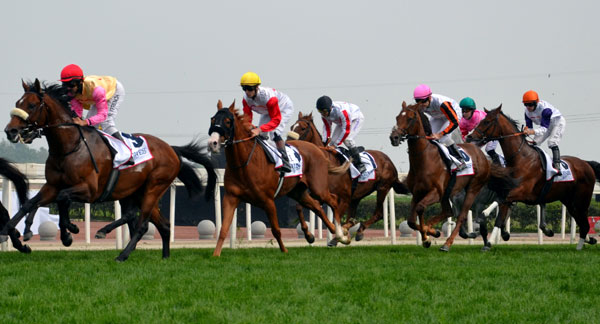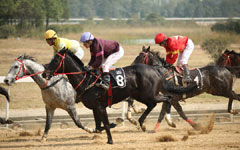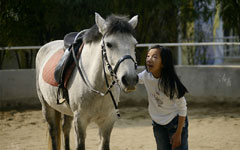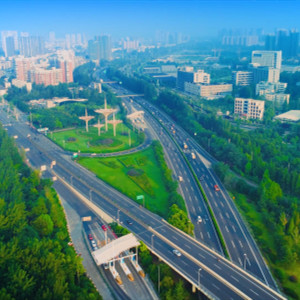UK to export horses for China courses
( China Daily )
Updated: 2014-04-14
 |
|
Horses and jockeys at the 2,200 meter Chengdu Dubai Intl Cup race, the final and richest race of the Chengdu Dubai Intl Cup Wenjiang-Meydan Classic, at the Jinma racecourse in Wenjiang district, Chengdu, Sichuan province, on April 6, 2014. [Photo by Peng Chao/China Daily] |
"Riding, breeding and training horses is increasingly popular in China, so this deal will ensure that we can make the most of the UK's world-famous thoroughbreds in boosting our burgeoning equine industry," Zhi says.
Carter Carnegie, international executive of the association Great British Racing International, says: "The export of horses will become a major benefit to the British racing industry as China's interest in racing continues to grow.
"It is fitting that both ministers could experience Newmarket, the birthplace of modern thoroughbred racing, which showcases the very best the sport has to offer."
|
 |
|
 |
During their time at Newmarket, Zhi and Paterson saw Frankel, now retired and in stud, where it costs 125,000 pounds (for him to service a mare.
Carnegie compares Frankel and British horseracing with watchmaking and Switzerland, the best at it in the world. Britain's racehorse breeds and the skills used in training racehorses have been passed down through history, he says.
The value of Britain's racehorse exports was 118 million pounds in 2012. Sales at Tattersalls, the bloodstock auctioneers, were worth 237 million pounds.
Carnegie predicts that sales of racehorses to China will take off soon. In recent years, Great British Racing International has been contacted by Chinese parties needing help with building racecourses and establishing horseracing systems, he says.
So having the export agreement signed is a first step to engaging in the growing Chinese horseracing market, he says, and, after Britain's racehorses start going to China, other help can follow.
Britain also has expertise in designing the governing structure for horseracing to ensure fair play and integrity, he says. Britain can also design and build racing venues, manage media coverage and design racing programs.
Professional horseracing first arrived in China with the establishment of early British expatriate communities in the middle 1800s. One legacy of this was The Shanghai Race Club, which remains a social racing club for wealthy Chinese racehorse owners competing in international races.



